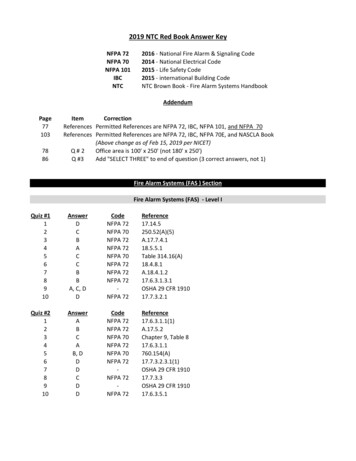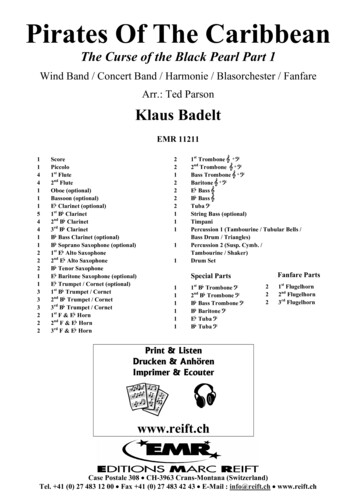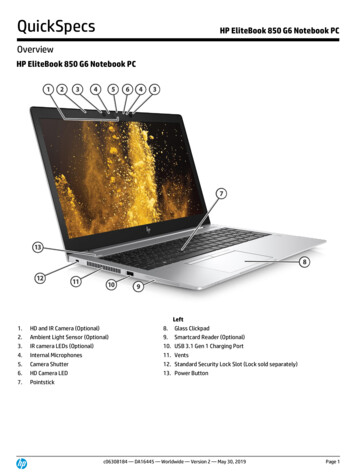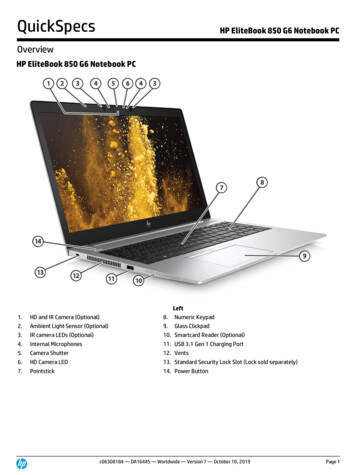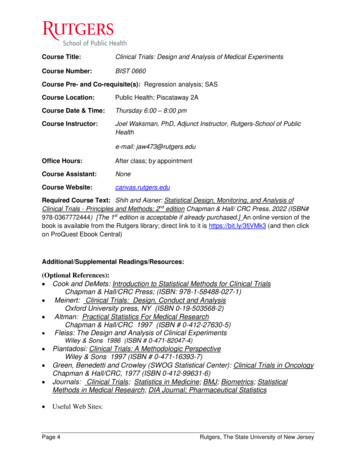
Transcription
Course Title:Clinical Trials: Design and Analysis of Medical ExperimentsCourse Number:BIST 0660Course Pre- and Co-requisite(s): Regression analysis; SASCourse Location:Public Health; Piscataway 2ACourse Date & Time:Thursday 6:00 – 8:00 pmCourse Instructor:Joel Waksman, PhD, Adjunct Instructor, Rutgers-School of PublicHealthe-mail: jaw473@rutgers.eduOffice Hours:After class; by appointmentCourse Assistant:NoneCourse Website:canvas.rutgers.eduRequired Course Text: Shih and Aisner: Statistical Design, Monitoring, and Analysis ofClinical Trials - Principles and Methods; 2nd edition Chapman & Hall/ CRC Press, 2022 (ISBN#978-0367772444) [The 1st edition is acceptable if already purchased.] An online version of thebook is available from the Rutgers library; direct link to it is https://bit.ly/3fjVMk3 (and then clickon ProQuest Ebook Central)Additional/Supplemental Readings/Resources:(Optional References): Cook and DeMets: Introduction to Statistical Methods for Clinical TrialsChapman & Hall/CRC Press; (ISBN: 978-1-58488-027-1) Meinert: Clinical Trials: Design, Conduct and AnalysisOxford University press, NY (ISBN 0-19-503568-2) Altman: Practical Statistics For Medical ResearchChapman & Hall/CRC 1997 (ISBN # 0-412-27630-5) Fleiss: The Design and Analysis of Clinical ExperimentsWiley & Sons 1986 (ISBN # 0-471-82047-4) Piantadosi: Clinical Trials: A Methodologic PerspectiveWiley & Sons 1997 (ISBN # 0-471-16393-7)Green, Benedetti and Crowley (SWOG Statistical Center): Clinical Trials in OncologyChapman & Hall/CRC, 1977 (ISBN 0-412-99631-6)Journals: Clinical Trials; Statistics in Medicine; BMJ; Biometrics; StatisticalMethods in Medical Research; DIA Journal; Pharmaceutical StatisticsUseful Web Sites:Page 4Rutgers, The State University of New Jersey
linicalTrials.gov https://clinicaltrials.gov/ICMJE guidelines on.htmlCourse Description:This course will teach students essential concepts and application of a wide range of statisticalmethods used in design, conduct, monitoring, and analysis of medical experiments.Prerequisites are BIST 0625J (Fundamentals of Biostatistics), BIST 0535J (BiostatisticalComputing), BIST 0551J (Applied Regression Analysis for Public Health Studies), or theirequivalents. Students are expected to participate in group discussions during the class.Selected Concentration Competencies Addressed:The competencies addressed in this course for the MS, MPH, DrPH, and PhD in Biostatisticsinclude:1.2.3.4.5.6.Apply basic probability theory and standard statistical methods to problemsrelevant to biomedical, clinical and public health research;Conduct complex statistical analyses for a broad range of applications;Use statistical computer packages to simulate, organize, analyze or report data;Design experimental and observational studies in biomedical, clinical and publichealth research;Critically analyze statistical methodology in scientific literature;Provide leadership for a cross-disciplinary team working on the design and/oranalysis of a research study.Please visit the Concentration webpages on the School of Public Health’s website atsph.rutgers.edu for additional competencies addressed by this course for other degrees andconcentrations.Please visit the Concentration webpages on the School of Public Health’swebsite at sph.rutgers.edu for additional competencies addressed by this course for otherdegrees and concentrations.Course Objectives: After completing this course, the students should be able toa. Participate in a clinical trial team in either an academic or an industrial setting,b. Function as a team member and contribute in the understanding and development of atrial protocol,c. Follow the design and conduct of a clinical trial, as well as assist in basic statisticalanalyses of efficacy and safety data,Page 4Rutgers, The State University of New Jersey
d. Read published clinical trial papers critically.Course Requirements and Grading: GRADING basis:1. Attendance and participation: 10 pts2. Homework assignment: 20 pts3. Midterm: 35 pts4. Final: 35 ptsTotal:Competency12 100 pts.Course Objectives(s)a, b, ca, bClasses1 - 158, 9, 12-153a, b, c1, 7-144a, b, d1-7, 10-1556da, b2, 3, 4, 10, 1113Note: the school-wide uniform grading scale:Grading Policy: 94 –90 –87 –84 –80 –77 –70 – 70 Assessment(s)Almost all homeworksHWK 5.1, 5.3, 8.1; Class12-14 homework; FinalexamHWK 0, 2.2, 2.3, 3.2,Class 5-14 homework,Midterm exam; FinalexamClasses 1-7, 10-15homework, Midtermexam, final examHWK 2.1, 6.3HWK 7.1100 94 90 87 84 80 77FAAB BBC CRutgers SPH students honor code (see below) will be observed.Homework assignments are expected to complete on time, and the grading will be based ontheir completion. Typed homework is preferred over handwritten ones. Computerprogramming work (SAS) should be posted (or e-mailed) in addition to paper. Discussionamong students regarding homework is ok, but recommend that actual work should be bythe individual. If help is needed on the homework, then request a Zoom meeting with me.Use of Canvas for class material distribution.Midterm exam will be due March 10 (Note: Spring Break 3/12-20), final exam will be dueMay 5 (Note: Last day to submit grades 5/11).Page 4Rutgers, The State University of New Jersey
Course Schedule:This is a planned week by week schedule, which may be adjusted as the class progresses:1. Overview (1/20) [Class 1]1.1 “Housekeeping”1.2 Basic clinical trial concepts1.3 Ethics of clinical research2. Concepts and Methods of Statistical Designs (1/27, 2/3) [Class 2-3]2.1 External Validity2.2 Internal Validity2.3 Repeatability2.4 Bias2.5 Random Sample and Randomization2.6 Methods for Randomization3. Efficiency with Trade-offs and Crossover Designs (2/3, 2/10) [3-4]3.1 Statistical Efficiency of a Design3.2 Cross-Over Designs3.3 Analysis of 2x2 Cross-Over Designs4. Sample Size and Power Calculations (2/17, 2/24, 3/3) [5-7]4.1 Fundamentals4.2 Comparing Means for Continuous Outcomes4.3 Comparing Proportions for Binary Outcomes4.4 Comparing Time-to-Event (Survival) Endpoints4.5 Clustered (or Correlated) Observations4.6 Sample Size for Testing a Non-Inferiority or an Equivalence Hypothesis4.7 Comparing Ordinal Endpoints by Wilcoxon-Mann-Whitney Test4.8 Sample Size Adjustments4.9 Sample Size by Simulation and Bootstrap Midterm due March 10th5. Analysis of Covariance and Stratified Analysis (3/3, 3/10) [7-8]5.1 Principles of Data Analysis5.2 Continuous Response – ANOVA & ANCOVA5.3 Variance Reduction by CovariatesPage 4Rutgers, The State University of New Jersey
5.4 Stratified Analysis5.5 Logistic Regression 3/17 Spring Break6. Regression Analysis of Survival Data (3/24) [9]6.1 Kaplan-Meier Estimate and Log-Rank Test6.2 Cox Regression and Proportional Hazards / Interpretation of Coefficients6.3 Inference on Regression Coefficients Based on Partial Likelihood6.4 Baseline Cumulative Hazard and Survival Function6.5 Residuals for Model Diagnostics7. Sequential Designs and Methods – Part I: Expected Sample Size and Two-StagePhase II Trials in Oncology (3/31, 4/7) [10-11]7.1 Maximum Sample Size and Expected Sample Size7.2 One-Stage Versus Two-Stage Cancer Phase II Trials7.3 Simon’s Two-Stage Designs8. Sequential Designs and Methods -- Part II: Monitoring Safety and Futility (4/7,4/14, 4/21) [11-13]8.1 Monitoring Safety8.2 Monitoring Futility with Conditional Probability9. Sequential Designs and Methods -- Part III: Classical Group-Sequential Trials(4/21, 4/28) [13-14]9.1 Regulatory Requirements and Logistical Considerations for Trial Monitoring9.2 Statistical Methods9.3 Power, Information, and Drift Parameter9.4 P-value When Trial is Stopped9.5 Estimation of Treatment Effect Final Exam due May 5th10. Monitoring the Maximum Information (5/5) [15]10.1 Sample Size Re-Estimation10.2 Monitoring Trial Duration for Studies with Survival Endpoints10.3 Modification of the Classical Group Sequential Alpha-Spending Function Procedure10.4 Adaptive Group Sequential ProcedurePage 4Rutgers, The State University of New Jersey
Learning Management System: Canvas will be used extensively throughout the semester for coursesyllabus, assignments, announcements, communication and/or other course-related activities. It is thestudent’s responsibility to familiarize themselves with Canvas and check it regularly. If you havedifficulties accessing Canvas, please inform the instructor and Canvas Support(help@canvas.rutgers.edu). Canvas is accessible at canvas.rutgers.edu.School of Public Health Honor Code: The School of Public Health Honor Code is found in the SchoolCatalog (sph.rutgers.edu/academics/catalog.html). Each student bears a fundamental responsibility formaintaining academic integrity and intellectual honesty in his or her graduate work. For example, allstudents are expected to observe the generally accepted principles of scholarly work, to submit their ownrather than another’s work, to refrain from falsifying data, and to refrain from receiving and/or giving aidon examinations or other assigned work requiring independent effort. In submitting written material, thewriter takes full responsibility for the work as a whole and implies that, except as properly noted by use ofquotation marks, footnotes, etc., both the ideas and the works used are his or her own. In addition tomaintaining personal academic integrity, each student is expected to contribute to the academic integrityof the School community by not facilitating inappropriate use of her/his own work by others and byreporting acts of academic dishonesty by others to an appropriate school authority. It should be clearlyunderstood that plagiarism, cheating, or other forms of academic dishonesty will not be tolerated and canlead to sanctions up to and including separation from the Rutgers School of Public Health.Students with Disabilities: Rutgers University welcomes students with disabilities into all of theUniversity's educational programs. In order to receive consideration for reasonable accommodations, astudent must apply for Services by first completing a Registration Form with the Rutgers Office ofDisability Services (ODS) at ods.rutgers.edu. The student will also be required to participate in an ODSintake interview and provide documentation. If reasonable accommodations are granted, ODS will provideyou with a Letter of Accommodations which should be shared with your instructors as early in yourcourses as possible.Commitment to Safe Learning Environment: The Rutgers School of Public Health is committed tohelping create a safe learning environment for all students and for the School as a whole. Freeexpression in an academic community is essential to the mission of providing the highest caliber ofeducation possible. The School encourages civil discourse, reasoned thought, sustained discussion, andconstructive engagement. Provocative ideas respectfully presented are an expected result. Anenlightened academic community, however, connects freedom with responsibility. The Schoolencourages all students to disclose any situations where you may feel unsafe, discriminated against, orharassed. Harassment or discrimination of any kind will be not tolerated and violations may lead todisciplinary actions.Reporting Discrimination or Harassment: If you experience any form of gender or sex-baseddiscrimination or harassment, including sexual assault, sexual harassment, relationship violence, orstalking, know that help and support are available. You may report such incidents to the RBHS Title IXOffice or to the School of Public Health’s Office of Student Affairs. Rutgers University has staff memberstrained to support survivors in navigating campus life, accessing health and counseling services,providing academic and housing accommodations, and more. If you experience any other form ofdiscrimination or harassment, including racial, ethnic, religious, political, or academic, please report anysuch incidents to the School’s Office of Student Affairs. The School strongly encourages all students toreport any incidents of discrimination or harassment to the School. Please be aware that all Rutgersemployees (other than those designated as confidential resources such as advocates, counselors, clergyand healthcare providers as listed in Appendix A to Policy 10.3.12) are required to report informationabout such discrimination and harassment to the School and potentially the University. For example, ifyou tell a faculty or staff member about a situation of sexual harassment or sexual violence, or otherrelated misconduct, the faculty or staff member must share that information with the RBHS Title IXCoordinator. If you wish to speak to a confidential employee who does not have this reportingresponsibility, you can find a list of resources in Appendix A to University Policy 10.3.12. For morePage 4Rutgers, The State University of New Jersey
information about your options at Rutgers, please visit Rutgers Violence Prevention and VictimAssistance.Graduate Student Computer Policy: Students are required to possess a personal laptop, no older thanapproximately two years, that must meet minimum requirements which may be found online tmlPolicy Concerning Use of Recording Devices and Other Electronic Communications Systems:When personally owned communication/recording devices are used by students to record lectures and/orclassroom lessons, such use must be authorized by the faculty member or instructor who must give eitheroral or written permission prior to the start of the semester and identify restrictions, if any, on the use ofmobile communications or recording devices.Policy Concerning Use of Turnitin: Students agree that by taking this course all required papers maybe subject to submission for textual similarity review to Turnitin.com (directly or via learning managementsystem, i.e. Canvas) for the detection of plagiarism. All submitted papers will be included as sourcedocuments in the Turnitin.com reference database solely for the purpose of detecting plagiarism of suchpapers. Use of the Turnitin.com service is subject to the Usage Policy posted on the Turnitin.com site.Students who do not agree should contact the course instructor immediately.Withdrawal/Refund Schedule: Students who stop attending their course(s) without submitting acompleted Add/Drop Course form will receive a failing grade. Furthermore, students dropping to zerocredits for the semester are considered withdrawn and must submit a completed Leave of Absence formfrom the School of Public Health’s Office of Student Affairs. The School of Public Health refunds tuitiononly. Administrative and technology fees are non-refundable. You may find the Withdrawal/RefundSchedule on the School of Public Health website lFor In-Person and Hybrid Courses:Special Circumstances During COVID-19 (For Spring 2022)To keep our on-campus communities safe, compliance with all current guidance andpolicies as set forth in the Guide to Returning to Rutgers is required at all times andwithout exception. Students, faculty, staff, or visitors who do not comply with thesepolicies will not be permitted to remain on-site. The use of face-coverings indoors *IS*required in classrooms and offices as well as shared spaces (such as hallways andbathrooms). Rutgers employees and students must use the My Campus Pass symptomchecker, a self-screening application, each day when traveling to campus or entering aRutgers building. Please remember to wash your hands, wear a mask while indoors,particularly in crowded spaces and groups, and stay up-to-date on university guidanceby consulting the Guide to Returning to Rutgers and the university’s COVID-19 website.In addition, the School of Public Health recognizes that students may experiencechallenges or be negatively impacted due to the COVID-19 pandemic, mental andemotional health toll from systemic racism, altered personal and professional obligations,and other crises existing at the moment in our local, national, and global communities.Students are encouraged to discuss these challenges and circumstances with theirinstructor, if they feel they may need additional support or temporary accommodations atthe beginning or during this course. The course instructor may consider makingreasonable temporary adjustments depending on the student’s situation. If additionalPage 4Rutgers, The State University of New Jersey
support is needed, students may reach out to the Office of Student Affairs(studentaffairs@sph.rutgers.edu) or any of the appropriate referral resources listed onthe SPH Student Connect Canvas page.Page 4Rutgers, The State University of New Jersey
Page 4 Rutgers, The State University of New Jersey Course Title: Clinical Trials: Design and Analysis of Medical Experiments Course Number: BIST 0660 Course Pre- and Co-requisite(s): Regression analysis; SAS Course Location: Public Health; Piscataway 2A Course Date & Time: Thursday 6:00 - 8:00 pm Course Instructor: Joel Waksman, PhD, Adjunct Instructor, Rutgers-School of Public



